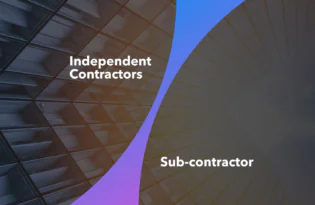Legal requirements for hiring independent contractors
Hiring contractors? Know the rules before you onboard. Here’s what every business needs to understand about the legal requirements for hiring independent contractors.

Hiring independent contractors is a smart way to scale your operations, whether handling short-term projects or building a flexible, global workforce. It allows businesses to stay agile without committing to full-time hires for every role.
That said, working with contractors, especially across borders, comes with its own set of challenges. Chief among them are the legal requirements for hiring independent contractors, which vary by jurisdiction and carry real compliance risks if overlooked.
This guide will teach you everything you need to know to hire and manage contractors confidently with fewer legal complexities.
Legal requirements for hiring independent contractors
Understanding the legal distinction between employees and independent contractors is the foundation of legal compliance.
| Worker Type | Description |
|---|---|
| Employee | Performs regular duties under the company’s control. The employer dictates when, where, and how work is done. |
| Independent Contractor | A self-employed individual or business entity contracted to complete specific tasks with minimal supervision. The contractor controls how and when the work is performed. |
Classification tests and legal standards
To determine whether a worker qualifies as an independent contractor, businesses must assess multiple legal tests, including but not limited to:
| Test | Administered By | Key Factors |
|---|---|---|
| IRS Common Law Test | Internal Revenue Service (IRS) | – Behavioral Control: Does the business control how the work is performed? – Financial Control: Does the business control how the worker is paid or reimbursed? – Type of Relationship: Are there benefits, permanency, or obligations suggesting an employment relationship? |
| Economic Realities Test (2024 Rule) | U.S. Department of Labor (DOL), under FLSA | – Opportunity for profit or loss- Worker and employer investment- Degree of control- Permanence of the relationship- Skill level and independence- Whether work is integral to business |
| ABC Test | Certain states (e.g., CA, NJ, MA) | All three criteria must be met: A. The worker is free from control and directionB. The service is outside the usual course of businessC. The worker is engaged in an independent trade or business |
Legal documentation requirements
Even if the working relationship with a contractor feels informal or is built upon trust, proper documentation is both critical and essential.
For example, if a 1099 contractor later disputes their classification or claims employee benefits, your written agreement becomes a crucial part of your legal defense.
A well-structured independent contractor agreement will clearly outline the expectations while protecting both parties.
Documentation should also be included to comply with legal requirements for hiring independent contractors.
| Element | Purpose |
|---|---|
| Scope of Work | Outline what the contractor is being hired to do. |
| Compensation Terms | How much they’ll be paid, and under what conditions. |
| Payment Frequency | Weekly, biweekly, per milestone, etc. |
| Intellectual Property (IP) Ownership | Outline who owns the work produced?. |
| Confidentiality and Non-Disclosure | How sensitive information is protected. |
| Termination Clauses | How either party can end the agreement. |
| Independent Contractor Status Statement | Clearly states the contractor is not an employee. |
| Liability and Insurance Clauses | Outlines who is responsible for what in case of a dispute or accident. |
Independent contractor agreements and legal requirements are more than just paperwork. They’re your first line of defense in showing that the relationship was classified correctly and handled professionally.
Essential tax forms and compliance obligations
| Form/Obligation | Requirement |
|---|---|
| W-9 | Must be collected before the first payment to any U.S. contractor. |
| 1099-NEC | Filed if the contractor is paid $600 or more in a calendar year. |
| Backup Withholding | Required if a valid W-9 is not provided. |
| W-8BEN/W-8BEN-E | For non-U.S. contractors, in place of a W-9. |
| Record Retention | Maintain all contractor tax forms and contracts for at least 4 years. |
Employment law considerations
Most employee protections don’t cover Independent contractors, but some laws, especially in the U.S., can still apply, depending on where they’re based.
The table below includes common elements of a 1099 contractor agreement. Some are legally required, while others are just smart to include to keep things transparent and compliant.
| Area | Contractor Coverage |
|---|---|
| Minimum wage & overtime (FLSA) | ❌ Not covered |
| Workers’ compensation | ❌ Not covered |
| Unemployment insurance | ❌ Not covered |
| Anti-discrimination laws | ✅ May apply (e.g., Title VII, ADA) |
| Benefits (health, retirement) | ❌ Not applicable |
International considerations
Hiring global contractors adds legal complexity. You’re not just following domestic rules; you also need to account for the contractor’s local labor laws, country-specific regulations, and even provincial protections.
- Permanent Establishment (PE): Local governments may view consistent contractor work as taxable local business activity.
- Classification Differences: Some countries classify certain “contractors” as de facto employees.
- Data Privacy Laws: GDPR or other regional compliance may apply when storing contractor information.
- Payment & Tax Handling: Ensure foreign tax forms (e.g., W-8) and exchange compliance are in place.
Penalties for misclassification
The IRS can impose steep penalties on companies failing to declare contractor classification accurately. Below is an outline of different agencies and how they can penalize noncompliance.
| Agency | Penalties |
|---|---|
| IRS | Back taxes, unpaid employer contributions, interest, and fines. |
| DOL | Back pay, overtime wages, and civil penalties under FLSA. |
| State Agencies | Penalties under wage theft and labor misclassification laws. |
| Legal Liability | Lawsuits, class actions, and reputational damage. |
Best practices for compliance
Staying compliant when hiring independent contractors takes more than just collecting and filing tax forms. It starts with correctly classifying the worker from day one and having a straightforward process to support that.
| Compliance Step | Why it Matters |
|---|---|
| Use a worker classification checklist | Ensures each role meets legal criteria for 1099 classification. |
| Require a signed independent contractor agreement | Provides written proof of the contractor relationship. |
| Collect tax forms (W-9/W-8) before work begins | Supports proper tax reporting and audit readiness. |
| Avoid offering employee-like benefits or direction | Preserves contractor independence and limits liability. |
| Conduct annual audits of contractor roles | Identifies misclassification risks as the business evolves. |
| Consult legal or compliance experts regularly | Keeps your classification and documentation aligned with regulations. |
Hiring made easier with Payoneer Workforce Management
Knowing the legal requirements for hiring independent contractors gives you a great launch point for expanding your workforce. However, while managing independent contractors is often complex, it doesn’t have to be.
Payoneer Workforce Management gives your business the tools that support you with streamlining onboarding, payments, to offboarding while mitigating misclassification risks.
- Approve invoices, make contractor payments in one secure dashboard
- Scale hiring globally with seamless workforce management
- Get expert guidance to navigate evolving regulations
If you’re ready to simplify contractor hiring and compliance so you can focus on growing your business instead of managing workforce logistics, reach out today. We’d love to show you how we can help simplify your contractor management.
If you’re ready to take charge of your workforce, reach out today for a free demo.
Related resources
Latest articles
-
Employment laws in Sweden
Explore the employment laws in Sweden, a comprehensive guide to employees’ rights, employer obligations, and fair labor practices.
-
Employment laws in Poland
Explore the ins and outs of employment laws in Poland, an info-rich guide to employees’ rights, employer obligations, and fair labor practices that shape the future.
-
Employment laws in Indonesia
Find out more about Indonesia labor laws that dictate how employees should be contracted, managed, and paid, both on a national and state/territory level.
-
Employment laws in France
Learn about France’s labor laws dictating minimum wage, benefits, and more. Plus, discover the consequences of non-compliance with employment laws in France.
-
Employment laws in Spain
Find out more about Spain’s labor laws, from contracts and benefits to termination rules.
-
Employment laws in Australia
Find out more about the employment laws in Australia that dictate how employees should be contracted, managed, and paid, both on a national and state/territory level.
Disclaimer
The information in this article/on this page is intended for marketing and informational purposes only and does not constitute legal, financial, tax, or professional advice in any context. Payoneer and Payoneer Workforce Management are not liable for the accuracy, completeness or reliability of the information provided herein. Any opinions expressed are those of the individual author and may not reflect the views of Payoneer or Payoneer Workforce Management. All representations and warranties regarding the information presented are disclaimed. The information in this article/on this page reflects the details available at the time of publication. For the most up-to-date information, please consult a Payoneer and/or Payoneer Workforce Management representative or account executive.
Availability of cards and other products is subject to customer’s eligibility. Not all products are available in all jurisdictions in the same manner. Nothing herein should be understood as solicitation outside the jurisdiction where Payoneer Inc. or its affiliates is licensed to engage in payment services, unless permitted by applicable laws. Depending on or your eligibility, you may be offered the Corporate Purchasing Mastercard, issued by First Century Bank, N.A., under a license by Mastercard® and provided to you by Payoneer Inc., or the Payoneer Business Premium Debit Mastercard®, issued and provided from Ireland by Payoneer Europe Limited under a license by Mastercard®.
Skuad Pte Limited (a Payoneer group company) and its affiliates & subsidiaries provide EoR, AoR, and contractor management services.















